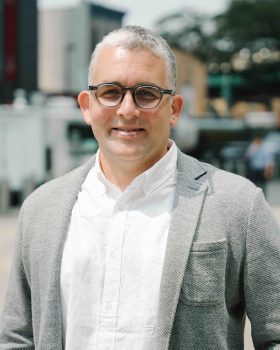
Visiting Assistant Professor of Law
Contact
christian.devos@law.cuny.edu
718-340-4004
Christian M. De Vos is a Visiting Assistant Professor at the CUNY School of Law. He previously taught in CUNY’s Human Rights and Gender Justice Clinic, lecturing and supervising student projects. Before joining CUNY’s faculty, Christian was the Research and Investigations Director at Physicians for Human Rights (PHR), where he managed all aspects of PHR’s research and helped oversee its rapid response initiatives, including convening a broad coalition of organizations documenting attacks on health in the context of Russia’s invasion of Ukraine and investigating the harmful impacts of post-Roe abortion bans on health care providers.
Prior to PHR, Christian served as a law clerk with the Office of Legal Affairs at the United States Courts of Appeals for the Circuit. He then spent over a decade with the Open Society Foundations (OSF), where he worked in a range of progressively more senior positions at the Open Society Justice Initiative (OSJI)—an operational program nested within the OSF network—to advance a broad range of human rights issues, principally through legal advocacy, research, and strategic litigation. At OSJI, he led a project team focused on strengthening the regional human rights systems in Africa, Europe, and the Americas, the UN Treaty Body system, as well as the International Criminal Court (ICC). This latter experience included being part of the legal team that successfully challenged sanctions imposed on the ICC Prosecutor by the first Trump administration.
Christian has taught and published in the areas of international human rights law and international criminal law, including the nexus between attacks on health and international humanitarian law, evidence and fact-finding, and domestic human rights implementation. He has authored numerous NGO reports, as well as submissions to human rights mechanisms and amicus briefs in federal and state courts. His books include the edited volume Contested Justice: The Politics and Practice of International Criminal Court Interventions (Cambridge Press, 2015) and Complementarity, Catalysts, Compliance: The International Criminal Court in Uganda, Kenya, and the Democratic Republic of Congo (Cambridge Press, 2020), which won the “Book of the Year” Award from the International Law Association’s American Branch. Christian has previously taught at Columbia University, the University of Leiden, and the University of Bristol. He currently serves on the Editorial Board of the American Society of International Law’s Insights series.
A member of the New York Bar, Christian received his JD from the American University Washington College of Law and his PhD from the University of Leiden. He also holds an MSc in international relations from the London School of Economics and a BA from Wesleyan University.